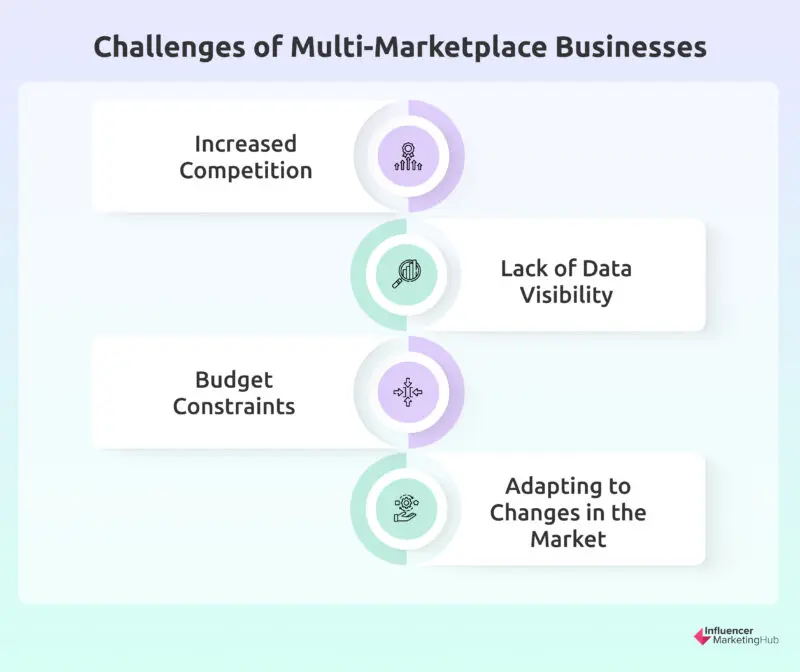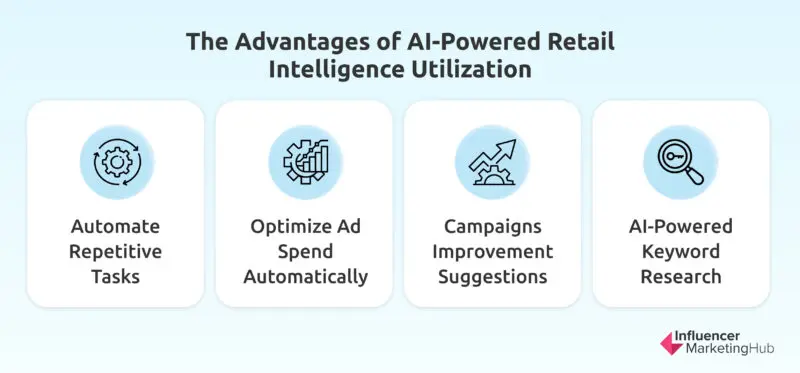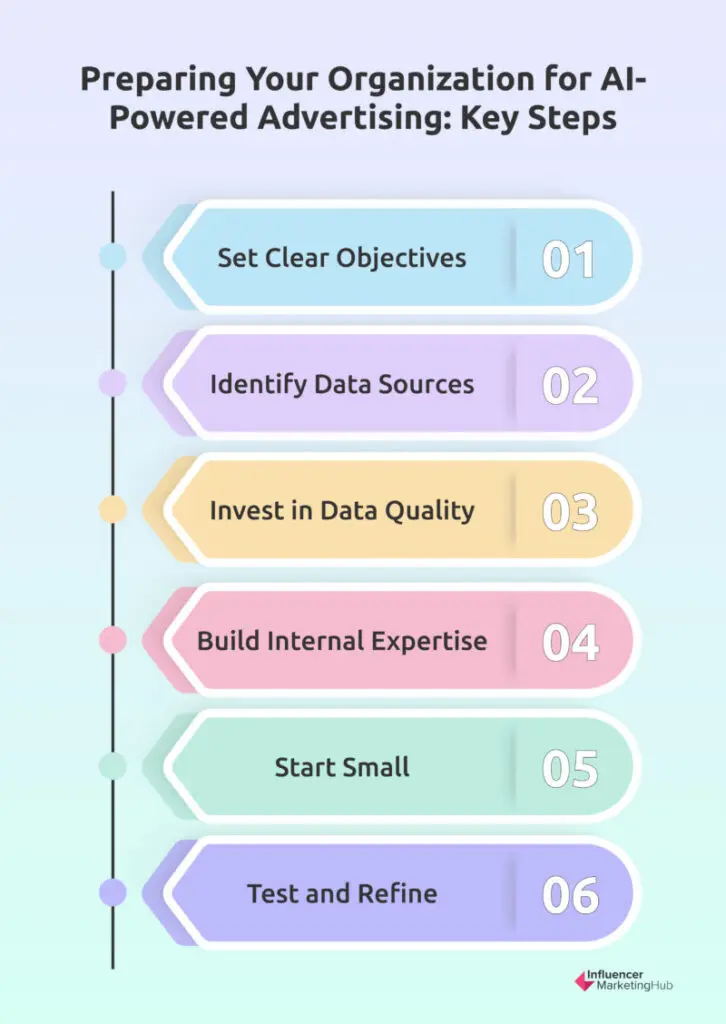Recent statistics reveal the explosive growth of AI-enabled advertising spending worldwide.
With 35% of businesses already using AI in their processes and another 42% exploring its integration, the adoption of AI is steadily increasing.
Artificial intelligence (AI) and machine learning (ML) have revolutionized digital advertising, with Amazon leading the way in utilizing these technologies.
AI-powered optimization and Retail Intelligence for Marketplace Advertising now enable marketers to achieve their goals more efficiently and effectively. In a competitive marketplace like Amazon, real-time data and insights are crucial for optimizing campaigns and making informed decisions.
- Managing Increasing Complexity for Multi-Marketplace Businesses
- AI-Powered Optimization Tools that Supports Several Popular e-Commerce Marketplaces. These Include:
- Benefits of Utilizing AI-powered Retail Intelligence
- Key Steps to Prepare Your Organization for AI-Powered Advertising Implementation
- Why Brands rely on AI-powered AdTech for ecommerce campaigns
- A case study: How Hisense Improve its Marketplace Ads with AI
- Conclusion
- Frequently Asked Questions
Managing Increasing Complexity for Multi-Marketplace Businesses
Multi-marketplace businesses face unique challenges when it comes to advertising. Here are some of the key difficulties that companies may encounter and strategies they can use to overcome them:
Increased Competition
The rise of e-commerce has led to increased competition from other sellers and brands across multiple marketplaces. To stand out, companies need to develop a unique value proposition and use targeted advertising strategies. For instance, they could employ retargeting ads to reach customers who have already shown interest in their products or services.
Lack of Data Visibility
With data scattered across various platforms, companies may struggle to get a clear picture of how their advertising campaigns are performing. To address this challenge, they can use analytics tools that consolidate data from different platforms into a single dashboard. This can help them identify trends and opportunities to optimize their advertising efforts.
Budget Constraints
Advertising across multiple marketplaces can be expensive, and companies need to allocate their budgets wisely to achieve the best possible return on investment (ROI). To optimize their ad spend, companies can use techniques such as A/B testing to identify the most effective ads and retargeting to reach customers who are most likely to convert.
Adapting to Changes in the Market
Market conditions can change rapidly, and companies need to be able to adapt quickly to remain competitive. To do this, they need to stay up-to-date on industry trends and consumer behavior and be willing to experiment with new advertising strategies. For example, they could use influencer marketing or social media advertising to reach new audiences.
To simplify the complexity of managing multiple marketplaces, companies can leverage advanced advertising technologies such as AI-powered advertising. By utilizing AI-powered advertising technology, they can improve targeting and personalization, optimize ad spend, and stay competitive in today's fast-paced digital landscape.
In conclusion, managing multi-marketplace businesses presents unique challenges for companies when it comes to advertising. By focusing on developing a unique value proposition, using targeted advertising strategies, and leveraging advanced technologies, companies can stay competitive and achieve their advertising goals.
AI-Powered Optimization Tools that Supports Several Popular e-Commerce Marketplaces. These Include:
Marketplace | Integrations |
Amazon | Perpetua, Quartile, Stackline |
eBay | Pacvue |
Walmart | Perpetua, Pacvue, Quartile, Stackline |
Instacart | Perpetua, Pacvue, Quartile, Stackline |
Etsy | Perpetua |
Target | Perpetua, Pacvue, Quartile |
Bol.com | Pacvue |
Albertsons | Pacvue |
CitrusAd | Pacvue |
Sam's Club | Pacvue |
Criteo | Pacvue |
Benefits of Utilizing AI-powered Retail Intelligence
The use of AI in advertising offers a plethora of benefits, including campaign optimization and better keyword research. AI-powered campaigns can help businesses to automate repetitive, daily tasks, freeing up the team to focus on more strategic tasks, while also improving campaign performance. By making every dollar count, AI-powered optimization can help lower costs, saving businesses money in the long run. Here are some of the benefits:
Automate Repetitive Tasks
AI-powered optimization tools have the potential to automate numerous repetitive and time-consuming tasks that come with managing Amazon ads. This automation can significantly improve campaign performance, while freeing up valuable time and resources for businesses to focus on more strategic tasks.
- Rule-Based Optimization
AI-powered optimization tools can adjust bids, keywords, and budgets based on the goals that matter most to your business. By setting specific rules, businesses can ensure that their campaigns remain on track and focused on achieving their objectives. - Smart Campaigns
AI-powered campaigns can keep companies moving in the right direction, with alerts to grab their attention only when it's needed. This ensures that businesses stay on top of their campaigns without being bogged down by irrelevant notifications.
Optimize Ad Spend Automatically
AI-powered optimization and Retail Intelligence for Amazon ads can help businesses save money and make every dollar count. With real-time data and advanced optimization techniques, businesses can ensure that their ad spend is used efficiently and effectively.
- Dayparting
By implementing hourly bid boosting, businesses can allocate their budget during peak hours when customers are most likely to convert. This approach ensures that advertising spend targets consumers at the most opportune times. - Automatic Bid Reductions
AI-driven optimization tools can automatically decrease bids on underperforming keywords or products with low inventory. This method conserves advertising budget by avoiding ineffective keywords. - Real-Time Budget Management
Multiple budget management settings allow businesses to adjust their budgets based on real-time traffic, performance, and spend. This feature ensures that companies are always in control of their ad spend, making necessary adjustments as needed.
Campaigns Improvement Suggestions
AI-powered optimization tools provide valuable insights and suggestions to improve campaigns. By taking advantage of these tools, businesses can ensure that their campaigns are optimized for success.
- Keyword Optimization
AI-powered optimization tools provide suggestions to increase bids on best-performing keywords and move budgets between campaigns. Through keyword suggestions, organizations can boost their efficiency and fully capitalize on every advertising format. - Advanced Ad Type Optimization
AI-powered optimization tools can optimize campaigns for various ad types, including Sponsored Products, Amazon DSP, Walmart Search Brand Amplifier, Instacart Display, and more. By optimizing campaigns for various ad types, businesses can reach a wider audience and maximize their ad spend.
AI-Powered Keyword Research
AI-driven enhancement for Amazon advertising can assist enterprises in expanding their reach and increase sales and ROAS through keyword research. By using advanced tools, businesses can identify new and related keywords and add them to relevant Ad Groups.
- Enhanced Keyword Research Tool
Pacvue's Enhanced Keyword Research Tool offers enterprises a sophisticated platform for performing comprehensive keyword analysis. By entering a keyword, product, or existing Ad Group into the search, companies can discover new and associated keywords. This resource enables organizations to refine their search results using filters such as match type, keyword volume, historical trends, and more. Additionally, the tool allows for seamless integration of keywords into pertinent Ad Groups with a single click.
Key Steps to Prepare Your Organization for AI-Powered Advertising Implementation
Implementing AI-powered advertising technology can be a game-changer for businesses seeking to optimize their advertising campaigns and stay competitive in this virtual scenery. However, before implementing AI advertising, businesses need to prepare their organization for this change. Here are some key steps businesses can take to prepare for AI advertising implementation:
Set Clear Objectives
Before diving into AI advertising, businesses must establish well-defined goals for their campaigns. This enables them to identify the KPIs to track and measure, such as conversion rate, click-through rate, or return on ad spend (ROAS).
Identify Data Sources
AI advertising relies on data to make informed decisions. For instance, businesses could use customer demographic data, browsing behavior, and purchase history to train AI algorithms to target ads more effectively.
Invest in Data Quality
High-quality data is essential for AI advertising success. To illustrate, businesses must ensure that data is accurate, up-to-date, and relevant, such as using real-time data to adjust bidding strategies in programmatic advertising.
Build Internal Expertise
Expertise is crucial for AI advertising implementation. Companies should train their marketing team members in AI-related skills or hire professionals experienced in AI-driven advertising, like managing Google Ads campaigns with Smart Bidding strategies.
Start Small
AI advertising can be complex, so businesses should begin with a single campaign or channel. For example, they could test AI-driven ad optimization on Facebook Ads before extending it to other platforms like Google Ads or Amazon Advertising.
Test and Refine
AI advertising involves ongoing learning. Companies must regularly evaluate and adjust their AI algorithms to improve performance. One example might be adjusting the targeting criteria for a lookalike audience on Facebook to improve the relevance of the ads.
In conclusion, implementing AI-powered advertising technology can be a game-changer for businesses seeking to optimize their advertising campaigns. However, to ensure a successful implementation, businesses need to prepare their organization by setting clear objectives, identifying data sources, investing in data quality, building internal expertise, starting small, and testing and refining their AI algorithms regularly. By following these steps, businesses can achieve their advertising goals with ease and accuracy.
Why Brands rely on AI-powered AdTech for ecommerce campaigns
The validity of AI-powered advertising technology has been proven through numerous studies and real-world applications.
Several studies have shown that AI-powered advertising technology can significantly improve campaign performance and ad spend efficiency. For example, a study found that AI-powered optimization resulted in a 252% increase in return on ad spend (ROAS) .
Real-world applications of AI-powered advertising technology have also demonstrated its effectiveness. For instance, Amazon's AI-powered advertising platform, Amazon Advertising, has been used by numerous businesses to optimize their advertising campaigns and achieve their advertising goals.
In addition, numerous businesses have reported significant improvements in campaign performance and ad spend efficiency after implementing AI-powered advertising technology. For example, Adidas reported a 52% increase in ROAS after using AI-powered advertising technology to optimize their campaigns.
A case study: How Hisense Improve its Marketplace Ads with AI
Hisense, a leading multinational electronics and appliances manufacturer, aimed to expand its U.S. market share for smart TVs. Employing Pacvue to create and optimize a highly efficient Walmart Sponsored Products strategy, Hisense achieved a 71.8% month-over-month Return on Ad Spend (ROAS), a 45.6% month-over-month Conversion Rate (CVR), and a 55.6% month-over-month Click-Through Rate (CTR). Consequently, Hisense increased its 2020 investment with Walmart Media Group by 10X.
Platform & Placement Bid Modifier Optimization
After a period of running campaigns, Hisense assessed performance based on placement (Search In-Grid and Buy-Box) and platform. Utilizing Pacvue's reporting feature, they quickly identified the best-performing placement and platform, applying suitable bid modifiers. These adjustments led to a 45.6% increase in CVR, an increase of 71.8% in ROAS, and a 10% decrease in CPC.
Dayparting Optimization
Pacvue's dayparting feature allowed Hisense to control when their ads ran on Walmart, choosing specific hours of the day. This approach helped cut unnecessary spend and concentrate the budget on more productive time slots. Following the implementation of a dayparting strategy through Pacvue's Walmart platform, they observed significant improvements in their campaigns. Post-dayparting optimizations resulted in a 227% increase in ROAS, a 184% increase in CVR, and an 18% decrease in CPC.
Managing Walmart Ads with Pacvue
Hisense experienced immediate results after making placement and platform bid modifier adjustments, as well as implementing dayparting optimizations. Additional benefits of using Pacvue included time-saving through the bulk operations feature and gaining competitive Share of Voice (SOV) insights on top keywords.
Conclusion
AI-powered optimization and Retail Intelligence for Amazon ads can help marketers achieve their goals more efficiently and effectively. By automating repetitive tasks, reducing wasted ad spend, and providing valuable insights, AI-powered optimization can help marketers stay ahead in a highly competitive marketplace. The case study of Hisense illustrates the benefits of using Pacvue to optimize Walmart Sponsored Products strategies, and how AI-powered optimization can lead to significant improvements in campaign performance. As Amazon's advertising revenue continues to grow, it is becoming increasingly important for marketers to leverage AI-powered optimization and Retail Intelligence to stay ahead of the competition.
Frequently Asked Questions
What is the significance of AI-powered optimization for Marketplace Ads in 2025?
AI-powered optimization can help marketers achieve their advertising goals more efficiently and effectively than ever before. By providing valuable insights into consumer behavior, campaign performance, and keyword research, AI-powered tools have become crucial for markets.
What are the key challenges in managing Multi-Marketplace Businesses and their advertising needs?
Some of the key challenges that businesses face when managing Multi-Marketplace Businesses and their advertising needs include increased competition, lack of data visibility, budget constraints, and adapting to changes in the market.
What are the benefits of utilizing AI-powered Retail Intelligence?
The use of AI in advertising offers numerous benefits, including campaign optimization, better keyword research, and cost-saving.
What are the key steps businesses can take to prepare for AI advertising implementation?
Businesses can set clear objectives, identify data sources, invest in data quality, build internal expertise, start small, and test and refine their AI algorithms regularly to prepare their organization for AI advertising implementation.
Why do brands rely on AI-powered AdTech for e-commerce campaigns?
AI-powered advertising technology can significantly improve campaign performance and ad spend efficiency. Real-world applications have demonstrated its effectiveness, and numerous businesses have reported significant improvements in campaign performance and ad spend efficiency after implementing AI-powered advertising technology.
What is a case study illustrating the benefits of using Pacvue to optimize Walmart Sponsored Products strategies?
Hisense, a major multinational manufacturer of electronics and appliances, used Pacvue to build and optimize a highly efficient Walmart Sponsored Products strategy, achieving a 71.8% return on ad spend month-over-month, a 45.6% conversion rate month-over-month, and a 55.6% click-through rate month-over-month.
What is the significance of AI-powered optimization for Amazon ads?
AI-powered optimization can help businesses to automate repetitive, daily tasks, freeing up the team to focus on more strategic tasks, while also improving campaign performance. By making every dollar count, AI-powered optimization can help lower costs, saving businesses money in the long run.




